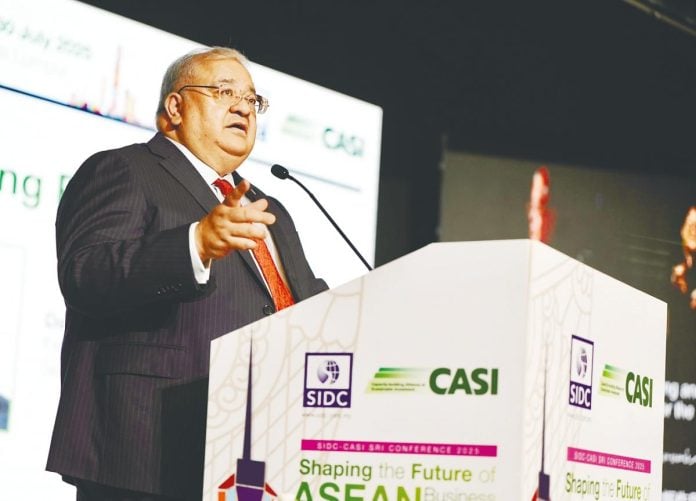KUALA LUMPUR: Investments are crucial in accelerating Asean’s sustainability journey, particularly in the development of green industries such as renewable energy, clean technology, and regional carbon markets.
To achieve carbon neutrality by 2050, the region will require an estimated US$3.7 trillion to US$6.7 trillion (RM15.6 trillion to RM28.3 trillion) in green investments.
Securities Commission Malaysia (SC) chairman Datuk Mohammad Faiz Azmi highlighted that Southeast Asia accounted for only 2% of global clean energy spending in 2023, underscoring the significant gap between current investment levels and the region’s long-term sustainability goals.
“Mobilising sufficient financing will be key to managing our transition successfully,” he said at the SIDC–CASI Sustainable and Responsible Investment (SRI) Conference 2025 today.
Faiz noted that Asean is poised to be a major contributor to global growth in the medium term, with its share projected to be about 33.7% of global gross domestic product.
However, he stressed that sustained resilience is essential amid ongoing geopolitical and economic uncertainties.
Elaborating on how the SC and its regional counterparts are working to ensure capital markets support a sustainable Asean, Faiz said it involves promoting the adoption of sustainable financing through the development of taxonomies to identify green activities and projects.
“The Asean Taxonomy for Sustainable Finance serves as a template to assess and classify eligible green activities,” he said.
Six key sectors – energy, transport and storage, construction and real estate, agriculture, manufacturing, and water and waste management – which together contribute 85% of the region’s greenhouse gas emissions, have been prioritised.
“The technical screening criteria developed for these sectors will help attract sustainable investments and financing,” Faiz said.
He emphasised that sustainable growth requires ongoing investment in resources and capacity-building.
“The SC is facilitating the establishment of an association for sustainability practitioners – including preparers, auditors, and other related professionals – to address current and future training needs, develop relevant skills, and set professional standards,” he said.
Malaysia’s Asean chairmanship includes leading the Asean Capital Markets Forum (ACMF), a regional platform for securities regulators.
Underscoring the importance of decarbonisation, Faiz noted that the ACMF recently issued the Asean Transition Finance Guidance to help companies create credible transition plans and secure the necessary financing.
“Carbon markets and mechanisms are taking shape across Asean member countries, and the ACMF is assessing the feasibility of introducing Voluntary Carbon Market Guidelines,” he said.
On the challenge of adaptation financing, Faiz pointed out that many adaptation projects – such as seawall construction – lack commercial returns and rely heavily on public funding. “There could be a role for market-based financing solutions if we can enhance the bankability of these projects.”
The SIDC–CASI SRI Conference 2025, jointly organised by the Securities Industry Development Corporation (SIDC) and the Capacity-building Alliance of Sustainable Investment (CASI), opened yesterday with a series of insightful dialogues, strategic partnerships and immersive experiences showcasing sustainable practices in Malaysia.
The three-day conference, which began yesterday, has attracted over 300 local and international delegates under the theme “Shaping the Future of Asean Business in Sustainability”.
A key highlight is the signing of a memorandum of understanding (MoU) between SIDC and CASI, formalising a long-term collaboration to advance sustainable finance education and talent development across Asean and other developing regions.
The MoU outlines a strategic framework for academic and professional cooperation, focusing on joint initiatives that enhance capacity in sustainable finance, particularly within emerging markets.
SIDC CEO Tengku Zarina Tengku Chik stated that the ongoing collaboration reflects a shared commitment to developing sustainable finance competencies not only in Malaysia but also across emerging markets in Asia and beyond.
CASI chairman Dr Ma Jun said the partnership with SIDC marks a significant step forward in promoting sustainable finance education and talent development across Malaysia and the Asean region.
Throughout the conference, participants will delve into critical topics such as ESG disclosures, Islamic SRI, sustainability taxonomies, carbon markets, green skills, and just transition financing, reinforcing Malaysia’s leadership in building a vibrant and resilient regional SRI ecosystem.








